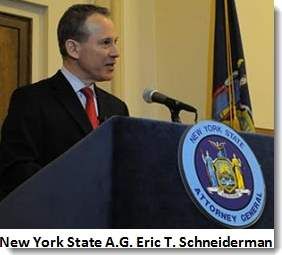Michael Collins
(New York Times, Oct 1) "The federal mortgage task force that was formed in January by the Justice Department filed its first complaint against a big bank on Monday, citing a broad pattern of misconduct in the packaging and sale of mortgage securities during the housing boom. The civil suit against Bear Stearns & Company, now a unit of JPMorgan Chase, was brought in New York State court by Eric T. Schneiderman, the state attorney general."
Schneiderman charged Bear Sterns and JPMorgan, which acquired Bear, with fraud under the state's Martin Act. Unique to New York, the act allows prosecutors the ability to vigorously pursue financial fraud with both civil and criminal charges. The investigative powers provided are broader than those found in any state or among regulators (e.g., the Securities and Exchange Commission).
EMC Mortgage, Bear's lending unit, "made material misrepresentations about the quality of the loans in the securities " and ignored evidence of broad defects among the loans that they pooled and sold to investors." EMC identified bad loans then demanded and received payments from originating lenders (firms they'd purchased the loans from). According to the indictment, the deception and fraud came when EMC failed to share any of the recovered fund with investors.
"Defendants
systematically failed to fully evaluate the loans, largely ignored the
defects that their limited review did uncover, and kept investors in the
dark about both the inadequacy of their review procedures and the
defects in the underlying loans." Eric T. Schneiderman, Attorney General, New York, October 1
The New York Times described this indictment is a shift away from specific cases of fraud to indictment for a general pattern of fraud on the part of big finance. Given the man behind the charges, this spells trouble for the big banks and Wall Street.
The Peoples Attorney General
Schneiderman was elected New York Attorney General in 2010 as his predecessor, Mario Cuomo, was elected governor. The AG has been a strong advocate for citizen protection from the corruptions of the big banks. Mortgage fraud has been a major focus. While many admired Schneiderman's goals at the outset of his term, Robert Sheer noted the risks: "Eric Schneiderman will probably fail, as did his predecessors in that job; the honest sheriff doesn't last long in a town that houses the Wall Street casino."
Schneiderman didn't falter. He was a hold out on the 50 state big bank-Wall Street fraud settlement which held perpetrators responsible for the financial crisis of 2008. Along with California Attorney General Kamala D. Harris , Schneiderman refused to sign the settlement deal until guarantees were added that allowed states to prosecute mortgage and securities fraud on their own despite the settlement. He now co-chairs the Residential Mortgage-Backed Securities Working Group "to continue investigating the foreclosure crisis." The crimes that can be investigated and prosecuted include robo-signing, the Mortgage Electronic Reporting System (MERS), mortgage fraud, rigging the municipal bond market, and the continuation of MERS-Wall Street mortgage packaging despite the obvious risks.
The Attorney General also has a record of actively assisting those in foreclosure, allowing many New Yorkers to save their homes.
JPMorgan developing a well-deserved reputation
This isn't JP Morgan's first trip to the rodeo. Federal Judge Jed Rakoff issued a devastating opinion on the business practices by the firm: "According to Judge Rakoff, 'by its actions JP Morgan thereby violated, at a minimum, the covenant of good faith and fair dealing by attempting to turn participation into what was really a disguised assignment of the loan that would cause irreparable harm to Cablevisi├â │n.'" (Author's emphasis) Judge Rakoff Nails JP Morgan Feb 22, 2010 (Also see, How JP Morgan treats its clients: scandalously and in bad faith by Felix Salmon)
Earlier this year, JPMorgan's reckless trading strategy cost investors $5.8 billion. The embarrassment from investor losses was compounded by Morgan's vast understatement of the original amount of the losses.. Chairman Dimon commented, "We learned a lot. I can tell you this has shaken our company to the core." Apparently, there's a prosecutor learning curve in place regarding the broad pattern of civil and potentially criminal violations by JPMorgan and the other made men of The Money Party.
A recent survey of trust in financial institutions showed just 23% of the public trusted the big banks like Morgan and only 15% had any trust in the stock market. Schneiderman should have a favorable audience with just about any jury he chooses. The low opinion of big banks and the latent anger at the lack of prosecutions for those who caused the financial collapse will explode given the slightest opportunity.
Even before this indictment, Janet Novack of Forbes characterized the most recent culprit in the title of her Forbes article, America's Trust in Banks Falling: Thank You, JPMorgan." JPMorgan's record and reputation precede the firm into any court.
Another distinct advantage for the AG is the law used to prosecute Morgan.
(Note: You can view every article as one long page if you sign up as an Advocate Member, or higher).






